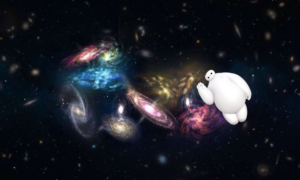Nerd Nite September 9th: Robots and Galaxies
World War II club
50 Conz Street, Northampton MA
Monday, September 9, 7:00pm, $5.00 admission (cash only)
Guests are welcome to bring their own food or order take-out at the venue
First Talk: “Where the Rubber Meets the Code: Designing Stretchy Sensors and Soft Robots”
Second Talk: “The Brightest Galaxies, Through a Lens Darkly”
————————
“Where the rubber meets the code: Designing stretchy sensors and soft robots”
What do Baymax from Big Hero 6 and the T-1000 from Terminator 2 have in common? Both are great examples of “soft” robots that can change their shapes to complete a lot of different tasks. Come and hear about some of the exciting work in making this type of robot and in making soft, stretchable sensors that help them understand their environments.
Kris Dorsey is an assistant professor of engineering at Smith College and teaches courses about circuits, robots, and miniature and micro-scale sensors. Kris’s research investigates the sensing properties and stability of stretchable mechanical sensors. She dreams about running away to join the circus.
————————
“The Brightest Galaxies, Through a Lens Darkly”
Like a fun-house mirror, massive objects such as large galaxies warp space-time around themselves. If a massive galaxy happens to lie between us and a more distant object, the farther one appears distorted and magnified. By chance, some of the very brightest starburst galaxies in the early universe, 10 billion light years away from our own Milky Way, appear stretched in just that way. Now that we’ve found them, we’re using every tool available including Hubble Space Telescope and the Atacama Large Millimeter Array in Chile to study these monster star-forming galaxies and try to learn how they work and what they turn into.
James Lowenthal is Professor and Chair of the Astronomy Dept. at Smith College. He studies galaxy formation and evolution in the early universe, and along with a team of Smith student researchers he uses Smith’s own roof-top telescope to study exoplanets orbiting nearby stars. He is active in fighting light pollution at the local, state, national, and international level.
————————
$5 entry – cash only. Guests under 21 years are welcome in the banquet room area, but are restricted from the front bar, so please have your ID on you if you’d like to order alcoholic beverages.
